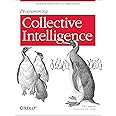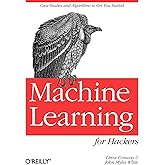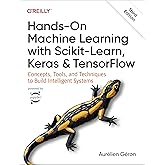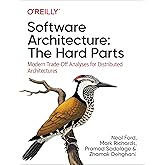Buy new:
-58% $20.99$20.99
FREE delivery February 24 - 25
Ships from: Textbooks by John Sold by: Textbooks by John
Save with Used - Good
$9.55$9.55
Ships from: Amazon Sold by: Zoom Books Company

Download the free Kindle app and start reading Kindle books instantly on your smartphone, tablet, or computer - no Kindle device required.
Read instantly on your browser with Kindle for Web.
Using your mobile phone camera - scan the code below and download the Kindle app.

Programming Collective Intelligence: Building Smart Web 2.0 Applications 1st Edition
Purchase options and add-ons
- ISBN-100596529325
- ISBN-13978-0596529321
- Edition1st
- PublisherO'Reilly Media
- Publication dateAugust 1, 2007
- LanguageEnglish
- Dimensions7.36 x 0.76 x 9.17 inches
- Print length334 pages
Frequently bought together

Customers who viewed this item also viewed
Editorial Reviews
About the Author
Product details
- Publisher : O'Reilly Media; 1st edition (August 1, 2007)
- Language : English
- Paperback : 334 pages
- ISBN-10 : 0596529325
- ISBN-13 : 978-0596529321
- Item Weight : 1.31 pounds
- Dimensions : 7.36 x 0.76 x 9.17 inches
- Best Sellers Rank: #822,295 in Books (See Top 100 in Books)
- #901 in Python Programming
- #1,650 in Artificial Intelligence & Semantics
- #2,539 in Computer Software (Books)
- Customer Reviews:
About the author

Toby Segaran is the author of "Programming Collective Intelligence," one of Amazon's top-selling AI books of all time. His latest titles, "Programming the Semantic Web" and "Beautiful Data" were released in July. He speaks on the subjects of machine learning, collective intelligence and freedom of data at conferences worldwide.
He currently holds the title of Data Magnate at Metaweb Technologies, where he works on large-scale data reconciliation problems. He is also a cofounder of freerisk.org, a non-profit aimed at creating more financial transparency.
Prior to Metaweb he founded Incellico, a biotechbology software company acquired in 2003. He holds a B.Sc. in Computer Science from MIT and US Government deems him a "Person of Exceptional Ability."
Customer reviews
Customer Reviews, including Product Star Ratings help customers to learn more about the product and decide whether it is the right product for them.
To calculate the overall star rating and percentage breakdown by star, we don’t use a simple average. Instead, our system considers things like how recent a review is and if the reviewer bought the item on Amazon. It also analyzed reviews to verify trustworthiness.
Learn more how customers reviews work on AmazonCustomers say
Customers find the book clear and instructive, with good content and examples. They describe it as a great resource for learning modern web algorithms. However, some customers report issues with the code quality, mentioning that it no longer works or is buggy. Opinions are mixed on value for money, with some finding it worth the cost and time, while others consider it not worth the money and frustrating to read. There are also mixed views on the age of the book, with some finding it new while others consider it slightly outdated.
AI-generated from the text of customer reviews
Customers find the book clear and instructive. They appreciate the succinct code examples and case studies that set up a baseline for applying the techniques. The tutorial style focuses on the basic workings of each algorithm, with exercises to solidify understanding and explore topics beyond the material in a chapter.
"This is a visionary book because it predicts a lot of what will happen to the Internet soon. How do we process information in the Internet age?..." Read more
"...is for those who realise programming, no matter what language, can do amazing things once you understand some simple concepts to tell a story..." Read more
"...Experience is a great teacher and if you go through what's given in the book, you'll solidly understand the basics as well as be able to use many..." Read more
"...- The very casual and easy-to-understand style comes at a price. The book does not go into the mathematical details of any of the algorithms...." Read more
Customers appreciate the book's content. They find it helpful for learning modern web algorithms with real-world examples. The book is a great resource with bright images, videos, and engaging web pages that make it enjoyable to read.
"...I like the latter a lot because it is rich with media content - with bright images, cool videos, wow-type web pages...." Read more
"...Gems like that make this book worth reading cover to cover...." Read more
"...what is available for those new to machine learning, and shows better than any other book how it applies to Web 2.0...." Read more
"...I learned about some great python libraries out there like beautiful soup and others which are useful in more ways than just the collective..." Read more
Customers have different views on the book's value for money. Some find it worthwhile and worth the time spent working through it, while others feel it's not worth the cost and leaves them with an incomplete feeling due to poor implementation.
"...ever read, though it takes a huge portion of your time, but it is worth it.It is my best buy from Amazon so far..." Read more
"...to their real-world data, and getting stuck because of the poor implementation." Read more
"Great book, with a lot of practical value." Read more
"...But reading it got a bit frustrating as the code samples seem to be out of sync with the text and I was left wondering whether I wasn't quite..." Read more
Customers have different views on the book's age. Some find it outdated, while others say the concepts have aged well. The book seems new but has some folds in the cover and pages. Some readers mention the examples are slightly dated, while others say the code no longer works.
"...However, it has become outdated and it is riddled with either old syntax and errors. I have gotten past most of that though...." Read more
"...algorithms world, and while it was a bit old even then, the concepts have aged well...." Read more
"...The only real drawback is that some of the examples are a bit out of date -- some examples try to import/draw from data on websites that don't exist..." Read more
"The book seems new but the cover and some of the pages were folded. Since it was sandwiched between two other books, this book looks damaged." Read more
Customers find the code in the book poor. They mention that the code is outdated, the examples are often buggy, and the implementation is not good. Some reviewers also mention incorrect lines of code and no longer working links.
"...The biggest problem with the book are the incorrect lines of code that pop up every once and a while...." Read more
"...objective benchmarks and tuning it off of those metrics, your rec system is useless)..." Read more
"...The example code is often buggy. Worse though, the example code often has differing output from the example code...." Read more
"...Too bad, there are codes but broken codes that cannot run. Errata helps for the codes in Chapter 2, where I managed to get them running...." Read more
Top reviews from the United States
There was a problem filtering reviews right now. Please try again later.
- Reviewed in the United States on October 21, 2008This is a visionary book because it predicts a lot of what will happen to the Internet soon. How do we process information in the Internet age? Instead of reading magazines and newspapers we use blogs as our source of news. This is because blogs offer much more customized news feed. In a typical newspaper, how much of its content is of interest to a reader? I guess half is a big value but typically it is less than that.
I start my working day with consuming two sweet drinks. One drink is a cup of coffee. Another is a virtual information soup made of 100 blogs. I glance over most of the stories quickly using Google Reader and select those that I am interested in. I might read them in greater detail later on during the day, in the evening, or on a weekend. I do not know which drink gives me more pleasure - the delicious cup of coffee or sweet virtual soup. I like the latter a lot because it is rich with media content - with bright images, cool videos, wow-type web pages.
However, I often discover news that I wish I found out earlier. In other words, there are so many news sources that reading them all or just looking at the headlines of major blogs will take too much time. We need targeted information delivery service.
This is the main idea of this book. In fact, it starts with explaining how to make recommendations given a set of preferences of a number of people and your own preferences. What are those cool things that you have not tried out yet but everybody else did? The example described in the book is applied to Delicious which does not offer recommendations yet.
I often try to decide what my interests are. The blogs that I am reading might answer this question if one builds groups of them. In fact, I have done this manually, but I found out that this categorization is not perfect. The book answers this question in Chapter 3.
After that the book deviates into a number of additional topics such as search, neural networks, discrete optimization. The author Toby Segaran has a great ability to explain difficult concepts using simple words and pictures. As most of the stuff was familiar to me I was wondering how easy a new concept seemed and how much time I spent originally understanding it.
After that the main melody of the book is there again - the next chapter explains how to filter documents, for example to decide if a particular news story is interesting to you or not. Then the book deviates again into decision trees and building price models and even matching people on a dating site. However, there comes our melody again - this time it explains how to extract trends from a lot of news sources, that is decide what people are discussing today. This feature is similar to Google News except that the user has no control of news sources.
I was surprised when I found out that Python is such a popular language in a scientific community. The book describes lots of libraries dealing with numerical data or displaying various charts. The book will serve as a great introduction to Python language even though there are lots of introductory books available. In fact, learning Python this way it easier and more enjoyable.
After reading the book I definitely want to try out the tricks explained there and improve my information soup. This book is my virtual cookbook.
- Reviewed in the United States on March 2, 2014There's a point every developer hits, that point where everything seems mundane, repetitive and not worth doing anymore. You might go on and try another language to spice up your life, but you then, again, realise same old, same old. You Grab something from the models, do some funky stuff in the business logic and then present. You know what to expect, your know how to do it.
This book is for those who realise programming, no matter what language, can do amazing things once you understand some simple concepts to tell a story through data. It gets you out of the mind set of, "I have some data stored here, and I will present it here". Instead, "I have some data stored here, how do I show, create understanding, explore, wedge out, predict, recommend it here"
Most of the topics presented in this book are not new in any sense, however they are not old either. They're tried and proven methods for creating meaning from datasets. They will be used for decades to come because they work! There are other books on the topics presented, like I said they are not new, however the simplicity of Python provides a frictionless entry for anyone wanting to get up and running with out a bloated IDE or framework to make it happen.
Those who are thinking, "well it's Python, and Python can't do X", I say to you a language does not determine what can and can not do it is the developer. At the end of the day the capability of the developer determines what the language can and can't do. If it seriously can't do something then build an extension to the language! With this thinking you can port what is presented in this book to any language. Python was chosen for it's simple constructs and readability.
If you're ever going to by a book on this topic buy this. Not the kindle, but the hard copy. The kindle version I've found doesn't present well for the code sections.
Overall this book is a great reference and is also a great primer if wanting to go deeper. It will allow you to tackle your next project with a different mindset and allow your users to discover and learn new things about their online surroundings and themselves!
Top reviews from other countries
 Nitish Kumar ThakurReviewed in India on April 29, 2019
Nitish Kumar ThakurReviewed in India on April 29, 20195.0 out of 5 stars Great for Understanding the absolute fundamentals of machine learning.
This book shows practically by showing python code exactly how to implement a wide variety of problems - in Optimization, Clustering, Prediction,Building Recommender Systems, etc. It explains the basics of some backbones of Data Analytics like Kernel Machines. Highly recommended for everyone.
 jzReviewed in France on April 12, 2017
jzReviewed in France on April 12, 20175.0 out of 5 stars Excellent
Book is in excellent condition and the book is very informative and interesting. I would recommned it to anyone who wants to learn machine learning.
-
 FeliceMenteReviewed in Italy on July 13, 2013
FeliceMenteReviewed in Italy on July 13, 20135.0 out of 5 stars Completo e chiaro
Libro completissimo, con un ampio range di argomenti coperti, sempre descritti con massima chiarezza e con sorgenti (in Python 2) di facile comprensione e modifica. Decisamente consigliato per chi ha intenzione di capire come implementare motori di ricerca o sistemi che associno tra loro dati, etc...
 R. WhiteheadReviewed in the United Kingdom on March 13, 2011
R. WhiteheadReviewed in the United Kingdom on March 13, 20115.0 out of 5 stars Fascinating and inspiring
This book covers algorithms that elsewhere are treated as artificial intelligence, but here are dealt with very rapidly and in a programmer's mindset. It's great to see ideas that have been considered "academic", such as neural networks, treated as no more frightening than other algorithms such as sorting. The description of how to use live web site APIs is also a great feature of this book.
-
 DirkReviewed in Germany on March 25, 2008
DirkReviewed in Germany on March 25, 20085.0 out of 5 stars Auf Schatzsuche im Web 2.0
Nachdem mich vor zwei Jahren Ruby on Rails in Wallung gebracht hat, fesselt mich zurzeit Collective Intelligence von Toby Segaran (Blog, Interview). Es wendet das eher trockene Thema Maschinelles Lernen mit spielerischer Leichtigkeit auf praktische Anwendungen im "Web 2.0" an. Auf jeweils wenigen Seiten stellt er einen Algorithmus direkt an einem praktischen Problem vor und liefert den Code gleich mit. Dabei spührt er auf Entdeckungsreise den von Internetbenutzern in Blogs, Lesezeichen, und Käufen preisgegeben Preferenzen nach:
* Ähnliche Webseiten mit Hilfe von del.icio.us empfehlen
* Blogs gruppieren und visualisieren
* Eine Wikipedia-Suchmaschine im Google-Stil bauen
* Reispläne mit Kayak Flugdaten optimieren
* Interessante Blogeinträge filtern
* Kriterien für Häuserpreise und Partnersuche finden
* eBay Preis vorhersagen
* Partner in Facebook suchen
* Nachrichtentrends und ihren Einfluss auf Aktienpreise analysieren
* Ausblick genetische Programmierung
Das Buch hat meine Fantasie geweckt, selbst im Web 2.0 auf Schatzsuche zu gehen. Wissen in so einer Gelassenheit und erfrischenden Kürze anzuwenden wie Toby Segaran es in seinem mittlerweile auch in Deutsch erschienenen Buch tut ist eine hohe Kunst, in der ich mich ebenfalls mehr üben möchte.











